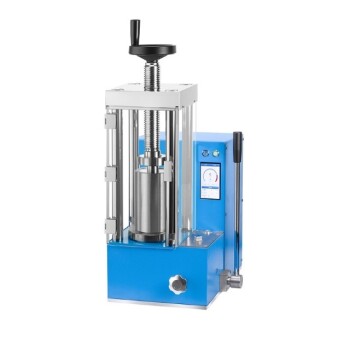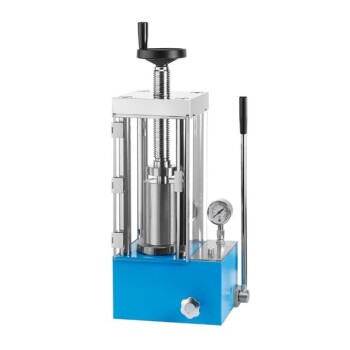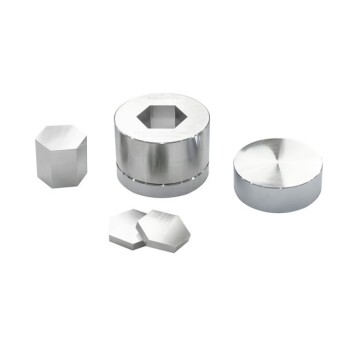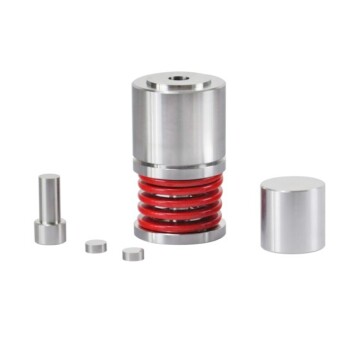Cold Isostatic Pressing (CIP) is a foundational manufacturing process used to create high-performance components across the aerospace, automotive, healthcare, electronics, and advanced materials sectors. It is specifically employed to consolidate metal, ceramic, or composite powders into a solid form with highly uniform density, which is critical for parts that must withstand extreme stress or have complex geometries.
The core value of CIP lies in its unique ability to apply uniform pressure from all directions to a powdered material. This creates exceptionally consistent, dense "green" components, a crucial first step for manufacturing complex and reliable parts that other methods cannot produce as effectively.
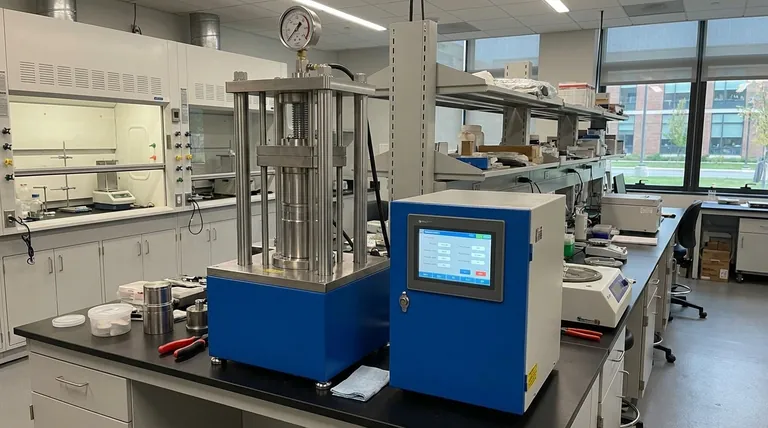
How Cold Isostatic Pressing Works
The Fundamental Process
Cold Isostatic Pressing involves placing a powder-filled, flexible mold into a high-pressure fluid chamber. The fluid is then pressurized, typically up to 60,000 psi or more, exerting equal force on the mold from all sides.
This uniform pressure compacts the powder into a solid, handleable object known as a "green" body. This part has enough strength to be handled but has not yet reached its final material properties.
The Key Advantage: Uniform Density
Unlike traditional pressing where pressure is applied from only one or two directions, CIP's hydrostatic pressure eliminates density variations within the part.
This uniformity is critical because it ensures predictable and consistent shrinkage during the final sintering or Hot Isostatic Pressing (HIP) stage, preventing warping, cracks, and internal defects in the finished product.
Key Industrial Applications of CIP
CIP is chosen when material integrity and complex shaping capabilities are paramount.
Aerospace and Defense
In aerospace, every gram matters. CIP is used to form lightweight yet incredibly strong components from advanced materials. These parts are essential for engine components, structural elements, and other high-performance applications where reliability is non-negotiable.
Automotive
The automotive industry uses CIP to produce durable engine components that must endure high temperatures and constant friction. Common examples include high-strength valve seats, pistons, and other critical engine parts where material consistency directly impacts performance and longevity.
Healthcare and Medical Implants
Biocompatibility and absolute reliability are essential for medical devices. CIP is the preferred method for manufacturing long-lasting medical implants, such as ceramic hip and knee replacements, due to the superior material properties and complex shapes it can achieve.
Electronics and Telecommunications
CIP is used to produce high-purity electrical insulators and other components for the electronics and telecommunications industries. The process ensures uniform dielectric properties and the ability to form the intricate shapes required for modern electronic devices.
Advanced Materials and Energy
The process is vital for the consolidation of advanced materials. This includes producing high-density isotropic graphite for industrial applications, consolidating ceramic powders for technical ceramics, and even manufacturing components for next-generation solid-state batteries.
Understanding the Trade-offs
When to Use CIP
CIP excels in producing parts with complex internal or external geometries that are difficult or impossible to create with other pressing methods. It is the go-to process when uniform density and predictable final properties are more important than production speed.
The Need for Secondary Processing
A part made by CIP is only a "green" body. It does not have the final strength or density required for its application. It must undergo a secondary high-temperature process like sintering or Hot Isostatic Pressing (HIP) to fully densify the material and achieve its final properties.
Limitations in Production Volume
CIP is typically a batch process, which can be slower and more labor-intensive than continuous methods like uniaxial pressing. This makes it less cost-effective for producing very simple, high-volume parts where minor density variations are acceptable.
Making the Right Choice for Your Application
Choosing a manufacturing process depends entirely on your end goal.
- If your primary focus is maximum material integrity in a complex shape: CIP is the superior choice for creating the initial component before final heat treatment.
- If your primary focus is high-volume production of simple parts: Alternative methods like die compaction or uniaxial pressing may be a more efficient and economical solution.
- If your primary focus is achieving near-100% density with zero internal porosity: CIP should be viewed as the critical first step before a final densification process like HIP.
Ultimately, Cold Isostatic Pressing is an enabling technology that unlocks the potential of advanced powdered materials for the most demanding engineering challenges.
Summary Table:
| Industry | Key Applications |
|---|---|
| Aerospace | Engine components, structural elements |
| Automotive | Valve seats, pistons |
| Healthcare | Ceramic hip and knee implants |
| Electronics | Electrical insulators, intricate shapes |
| Advanced Materials | Isotropic graphite, solid-state battery parts |
Ready to enhance your lab's capabilities with reliable Cold Isostatic Pressing? KINTEK specializes in lab press machines, including automatic lab presses, isostatic presses, and heated lab presses, designed to meet the demanding needs of laboratories in aerospace, automotive, healthcare, and more. Our equipment ensures uniform density and superior performance for complex parts. Contact us today to discuss how our solutions can benefit your specific applications and drive innovation in your projects!
Visual Guide
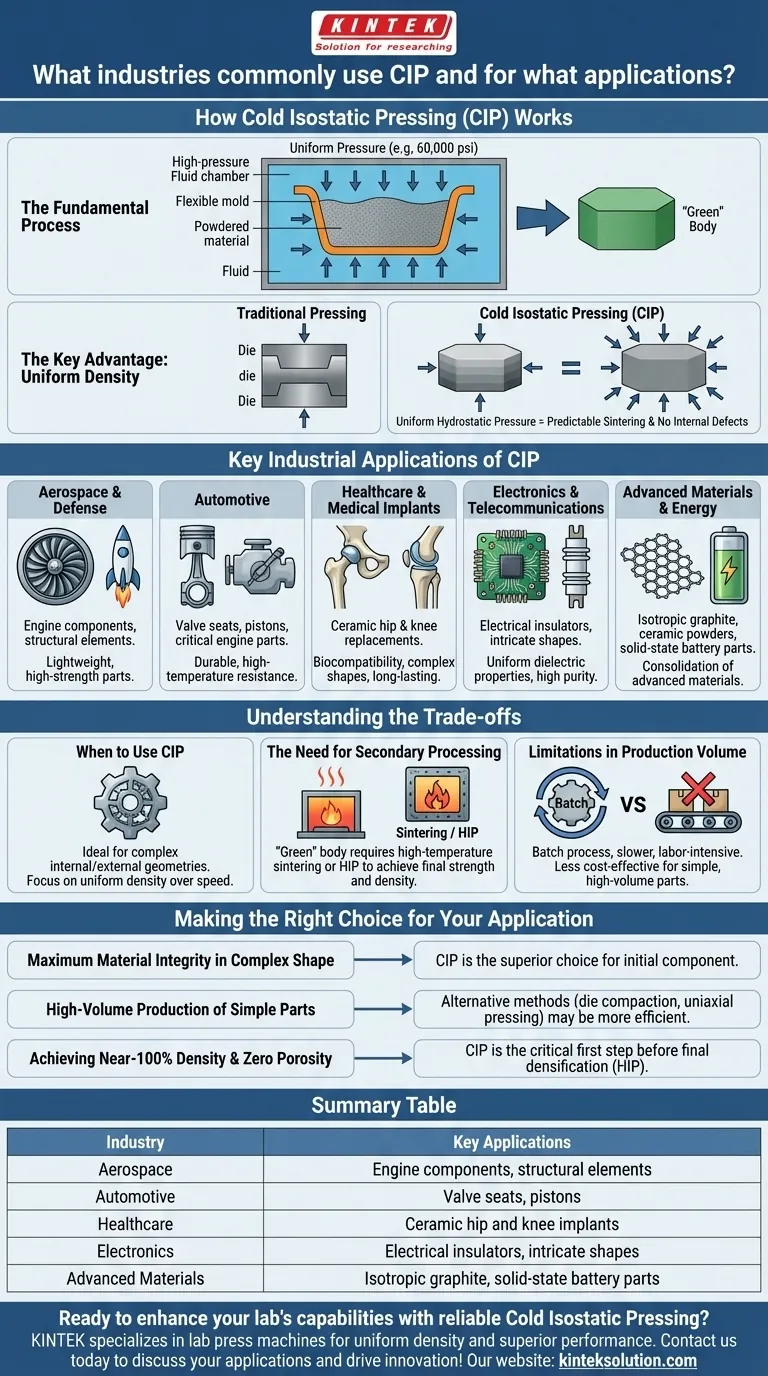
Related Products
- Electric Split Lab Cold Isostatic Pressing CIP Machine
- Electric Lab Cold Isostatic Press CIP Machine
- Automatic Lab Cold Isostatic Pressing CIP Machine
- Manual Cold Isostatic Pressing CIP Machine Pellet Press
- Automatic Laboratory Hydraulic Press Lab Pellet Press Machine
People Also Ask
- What are some specific aerospace applications of isostatic pressing? Enhance Performance and Reliability in Extreme Conditions
- Why is material loss low in cold isostatic pressing? Achieve High Material Yield with CIP
- What are the common forming processes in advanced ceramics? Optimize Your Manufacturing for Better Results
- How does CIP improve the mechanical properties of refractory metals? Boost Strength and Durability for High-Temp Applications
- What are the advantages of Cold Isostatic Pressing (CIP) for pellet preparation? Achieve Superior Density and Uniformity

